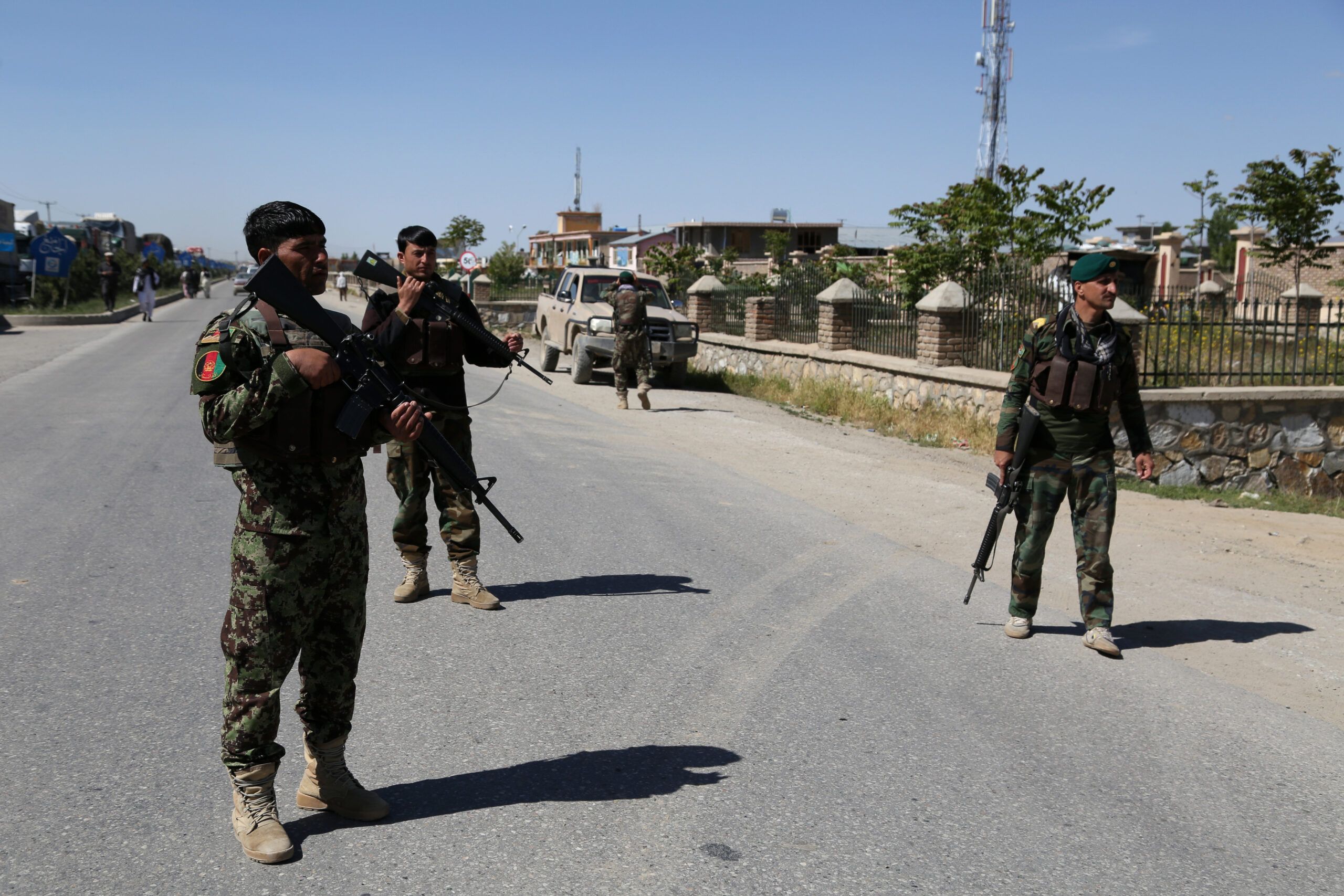Taliban claims Afghan bomb attack, demands prisoner release
Afghan security personnel stand guard near the site of a car bomb attack on the National Directorate of Security in Ghazni (ZAKERIA HASHIMI)
Ghazni (Afghanistan) (AFP) – The Taliban claimed a deadly attack on an Afghan intelligence agency post Monday, even as they urged the new power-sharing government to accelerate a prisoner swap to pave the way for talks.
At least seven intelligence personnel were killed by a car bomb in the eastern province of Ghazni, Wahidullah Jumazada, spokesman for the province’s governor told AFP.
“The terrorists have used a Humvee in their attack. They have targeted the National Directorate of Security unit in Ghazni city,” he said, adding that 40 people were wounded.
The interior ministry in Kabul and a health official in Ghazni confirmed the car bomb.
Taliban spokesman Zabihullah Mujahid said on Twitter that their insurgents had carried out the attack.
The bombing comes a day after President Ashraf Ghani and his rival Abdullah Abdullah signed a new power-sharing accord in Kabul, ending their bitter months-long feud.
The agreement overcomes one of the hurdles to negotiations with the Taliban, which warned Monday that talks cannot open until a so-far piecemeal prisoner swap is completed.
“That which is taking place in Kabul is only a repetition of the past failed experiences,” Suhail Shaheen, a Taliban spokesman, said on Twitter in what was the group’s first reaction to the Ghani-Abdullah deal.
“Afghan sides should focus on real and sincere solution to the issue… The prisoners’ release process should be completed and the intra-Afghan negotiations should start.”
The prisoner exchange was agreed under a US-Taliban deal signed in February, which excluded the Afghan government. Kabul has so far released about 1,000 Taliban prisoners, while the militants claim to have freed 263 government captives.
– ‘Undeclared spring offensive’ –
Last week President Ashraf Ghani ordered security forces to switch to an “offensive” position against the militants after two deadly attacks killed dozens of people.
A daylight raid on a Kabul hospital left at least 24 people dead, including mothers and infants.
That attack, which triggered international outrage, was followed by a suicide bombing at a funeral which killed at least 32 mourners.
The Taliban denied involvement in either attack, although Ghani blamed the militants and the Islamic State group.
Following Ghani’s order, the Taliban warned it would increase attacks against Afghan security forces.
“They have began their undeclared spring offensive and they have kept ties with international terrorist groups,” acting interior minister Masoud Andarabi told reporters.
Afghanistan’s chief of intelligence, General Ahmad Zia Siraj, said the US-Taliban deal was expected to lower violence.
“Unfortunately, the violence has not decreased. The Taliban have never welcomed peace,” he said at a joint press conference with Andarabi.
The Taliban have carried out more than 3,800 attacks and killed 420 civilians and wounded 906 since signing the deal with Washington, Siraj added.
Afghan army chief of staff General Bismillah Waziri said security forces were now planning “to start cohesive and systematic operations in areas where the threat level is high”.
Under the deal, Washington pledged to withdraw all of its forces by next year, in return for security guarantees from the Taliban and a promise that they would hold talks with the government in Kabul.
The United States, which wants to end its involvement in what has become its longest war, expressed hope that those talks could now move forward following the government’s political breakthrough on Sunday.
The new power-sharing deal stipulates that Abdullah will lead the peace process and will fill 50 percent of the new cabinet positions.
Secretary of State Mike Pompeo told Ghani and Abdullah “that the priority for the United States remains a political settlement to end the conflict”, his spokeswoman said in a statement.
Disclaimer: Validity of the above story is for 7 Days from original date of publishing. Source: AFP.


